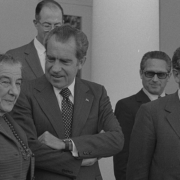2016: A Year of Drama-teries
As we look back at 2015 one word comes to mind: volatility. Though the swings felt dramatic, the S&P 500 Index actually had less volatility than what I would call a typical year. The peak-to-trough swings during the year were separated by 12.4%. Compare that to an average intra-year change since 1975 of 14%.
So why did a rather average 2015 feel like such a rollercoaster? Upon tripling in six years since the financial crisis in 2009 lows, the stock market “rested”. But media needs a story to tell, so they focused on three key targets: China, the Federal Reserve, and oil. They created Drama-tary.
Let’s start with a slowing Chinese economy. Frankly, I think it’s normal for an economy like this to eventually slow down. The move from emerging (agrarian) to consumer and production based economies is inevitable for a maturing country. Think about the facts: The US exports to China less than 1% of our total exports: hardly a large number. But the US is a major importer of goods from China, and when the dollar is strong as it is now, we get more for our dollar. I think this is a boom to every American consumer.
I think the bigger concern is how much we can trust the Chinese government. They are a communist country with a controlled economy, controlled currency, and controlled communication. How much should we believe? Fact versus fiction concerns me far more than a marginally slowing economy.
Next is the Federal Reserve and rising interest rates. December saw an increase of 0.25%. Savers went from earning nothing on their money, to virtually nothing. In my opinion, one-quarter of a percent has no meaningful impact on credit or the availability of money in the banking system. Yet if the media were to be believed, that small increase could have spelled the end of the American economy.
Lastly there’s oil which appears to be the limbo champion of late. The “how low can it go” pricing will certainly impact the earnings of oil companies and related services, but I see it as one of the greatest middle class tax cuts in American history. This decline in energy prices is a windfall for consumers, enabling them to reallocate more of their income. I think lower energy costs are a net positive for Americans as well as the global economy.
The price drop has very little to do with demand, but rather the innovation and the implementation of technology in the energy industry with 3D seismic, fracking and directional drilling. We are getting more energy out of the ground, easier, faster, and cheaper. It is a supply “problem” pressing prices down.
In summary, 2015 was a year of apocalyptic journalism noise about, well…nothing. I call it Drama-taryTM. and I expect a whole lot more in 2016, especially with an election. An investor’s best strategy may be simply turning off the TV. With the noise tuned out, it’s easier to stick to your investment plan and guard your temperament. Your portfolio should not play like a game of whack-a-mole.
Stay the course, invest in quality, diversify, and avoid emotional reactions. Call us if you have concerns or uncertainty, we’re here to help.
Steve Booren is the Owner and Founder of Prosperion Financial Advisors, located in Greenwood Village, Colo. He is the author of Blind Spots: The Mental Mistakes Investors Make and Intelligent Investing: Your Guide to a Growing Retirement Income and a regular columnist in The Denver Post. He was recently named a Barron’s Top Financial Advisor and recognized as a Forbes Top Wealth Advisor in Colorado.
There is no guarantee that a diversified portfolio will enhance overall returns or outperform a non-diversified portfolio. Diversification does not protect against market risk.
Investing involves risk including potential loss of principal. No strategy can ensure success or protect against a loss.







